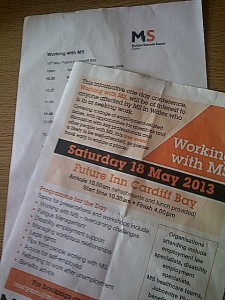Four out of five people with MS become unemployed within 10 years of diagnosis.
One in four people with MS of working age are employed, compared to three out of four of the wider UK population.
Shocking facts, considering MS is the most common neurological disorder among young adults and is most often diagnosed between the ages of 20 and 40.
With this in mind, and my experience of having been sacked after my own diagnosis, I attended the ‘Working With MS’ conference organised by the Multiple Sclerosis Society Cymru in Cardiff on Saturday. My leg was still excruciatingly painful so I took a walking stick, dosed myself up on painkillers and put a brave face on.
I had been invited to sit on a four-person panel of people with varying experiences in the workplace and we would each talk about how MS had affected our work. I’m not a public speaker by any stretch of the imagination and I was panicking. I used to hate standing up in school to talk about ‘What I Did On Holiday.’ I go bright red in the face, completely forget what I’m talking about and start gibbering nonsense.
I needn’t have worried, it went well (I hope). I am passionate about encouraging people not to accept bullying or discrimination at work. I was bullied for over a year, a sustained campaign to force me to resign. When I didn’t, I was sacked. I was coping with this alongside going through the whole MS diagnostic process and the combination of the two nearly drove me over the edge.
It was without a doubt the most difficult and soul-destroying time in my life and I don’t want anyone to go through what I did. With incredible support I started tribunal proceedings and won my case.
The conference was an excellent source of information, but we still have a long way to go to encourage people with MS to stay in work, to ask for adaptations and to educate employers. We have a lot of talent between us and it would be a travesty to let that go to waste…

